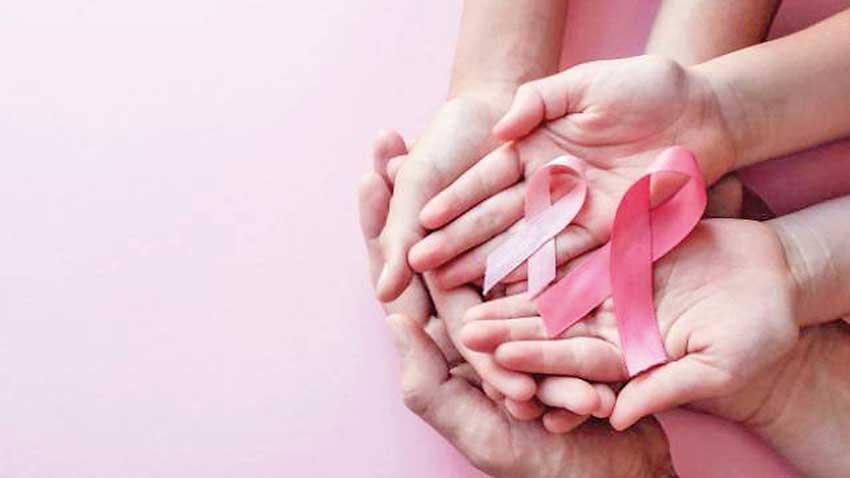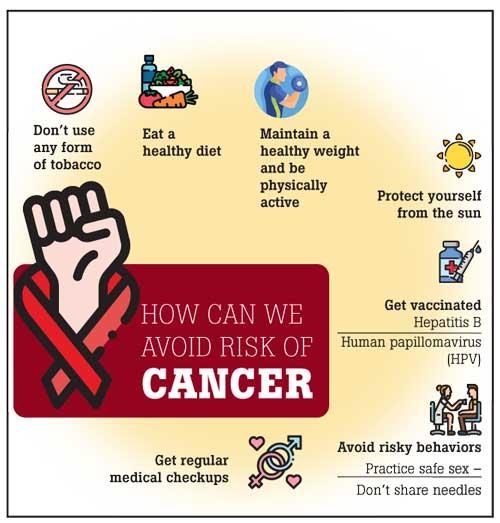05 Feb 2021 - {{hitsCtrl.values.hits}}

 World Cancer Day is observed worldwide on February 4. The aim is to raise awareness, educate and encourage people on cancer prevention, early detection and treatment, so that we will be able to save millions of preventable deaths each year due to cancer. This year is the ultimate year of the “I am and I will” campaign and together, all our actions matter for cancer prevention, early detection and treatment.
World Cancer Day is observed worldwide on February 4. The aim is to raise awareness, educate and encourage people on cancer prevention, early detection and treatment, so that we will be able to save millions of preventable deaths each year due to cancer. This year is the ultimate year of the “I am and I will” campaign and together, all our actions matter for cancer prevention, early detection and treatment.
How cancer arises
Cancer occurs due to the changes that happen in the genes of DNA molecules of the cell nucleus. Genes are responsible for controlling the way our cells function; especially how they grow and divide. During cell division, some of these genes can get damaged. But most of these damages in genes are properly repaired immediately by specific genes called DNA repair genes. However, some of these damages can be left without proper repair. Those damages are also called gene mutations. All of these gene mutations cannot cause cancer. Instead, mutations in specific genes can lead to cancer. Therefore, cancer is considered as a genetic disease.
‘Drivers’ of cancer
The gene mutations that contribute to cancer tend to affect three main types of genes and these changers are sometimes called ‘drivers’ of cancer. They are;

Proto-oncogenes are responsible for normal cell growth and division. However, when these genes are mutated or are unusually active than normal, they may become cancer causing genes, also called oncogenes, allowing cells to grow and survive without any control. Over 40 different types of proto-oncogenes have been discovered in the human body. Examples include: Ras, HER2, Myc and Cyclin D.
Tumor suppressor genes are also involved in controlling cell growth and division. More than 10 tumor suppressor genes have been identified. Moreover, they can be categorised into two different types called, ‘gatekeeper’ genes and ‘caretaker’ genes. Among both types, perhaps the most commonly mutated tumor suppressor gene found in cancer is TP53 gene. Other examples include: Retinoblastoma gene, APC gene (” gatekeepers”) and BRCA1/BRCA2 genes (“caretakers”).
DNA repair genes are involved in fixing damaged DNA. Cells with mutations in these genes tend to develop additional mutations in other genes. At the end there will be a huge collection of mutations in these cells which can lead to a cancer. There are three main different types of DNA repair genes found in human cells.
Early detection
Even though there are many different types of cancers, only few can be diagnosed early. Early detection of cancer can be done in three ways.
Cancer screening
In Sri Lanka screening programmes are presently active for early detection of breast, cervical and oral cavity cancers. Depending on prevalence, some countries have included prostate, liver, colon and rectum, esophagus and stomach cancers in to their cancer screening programmes.
Cancer treatments
If we detect cancer at a very early stage most of them can be totally curable. There are many effective cancer treatments now available even in Sri Lanka both in the government and private sector healthcare institutes. Day by day there are many improvements add into these treatments depending on the results of the continuous clinical trials.
Golden solution
Palliative care is the golden solution for all of those who are suffering due to life threatening diseases, including cancer. It is a crucial part of integrated, people-centered health services (IPCHS). Nothing is more people-centered than relieving their suffering, be it physical, psychological, social or spiritual. Palliative care should be intergraded at all levels of cancer care depending on need. These services are now developing and becoming available in Sri Lanka, both in government and private sector establishments.
While there have been numerous advancements in the understanding, diagnosis, and treatment of cancer – factors that should contribute to the decline of the disease – the number of new cancer cases diagnosed each year has globally continued to increase. The number of annual deaths worldwide from cancer has also increased – from 5.2 million people in 1990 to 8.2 million people in 2012 to an estimated 9.6 million in 2018. However, as many as 40 percent of deaths that happen due to cancer are preventable.
(The writer is a Consultant Clinical Oncologist)
21 Dec 2024 26 minute ago
21 Dec 2024 2 hours ago
21 Dec 2024 5 hours ago
21 Dec 2024 5 hours ago
21 Dec 2024 6 hours ago